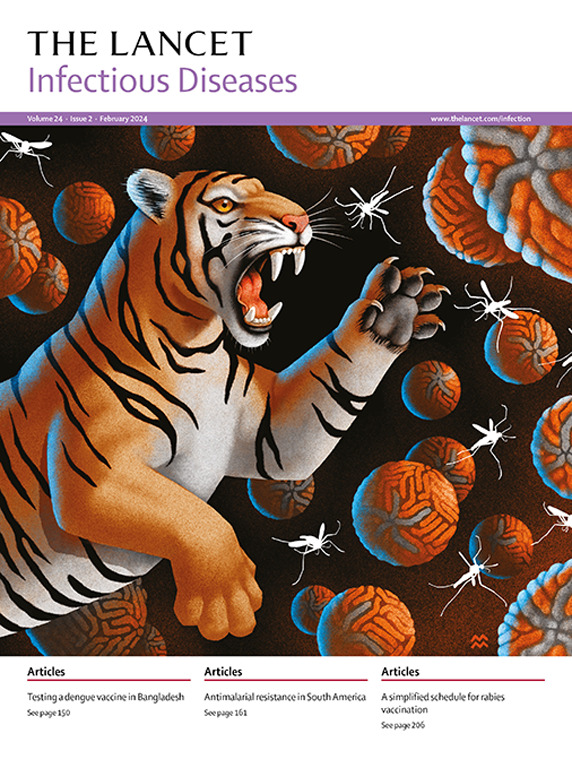Future immunisation strategies to prevent Streptococcus pneumoniae infections in children and adults
IF 36.4
1区 医学
Q1 INFECTIOUS DISEASES
引用次数: 0
Abstract
Streptococcus pneumoniae is a major respiratory pathogen, causing 1·2 million deaths and 197 million pneumonia episodes globally in 2016. The spread of S pneumoniae to sterile sites, such as the blood and brain, leads to invasive pneumococcal disease. The best approach available for prevention of invasive pneumococcal disease in children and, more recently, adults is the use of pneumococcal conjugate vaccines (PCVs). PCVs are also highly effective at preventing colonisation and, thus, transmission, offering indirect protection to non-target immunisation groups such as adults—a characteristic that has been crucial in their success. However, PCVs only include and protect up to 20 of the 100 serotypes that can cause disease. The rise in adult cases of invasive pneumococcal disease from serotypes included in PCVs suggests indirect protection might be limited. Additionally, non-vaccine serotypes and some vaccine types that persist, some linked to antibiotic resistance, continue to cause disease. Future vaccine strategies include increasing the number of serotypes covered in PCVs for use in children and adults, broader vaccine use in adults, the development of adult-specific conjugate vaccines containing serotypes different from those covered in PCVs used in children, and protein vaccines, all of which will be explored in this Review. These strategies are expected to help mitigate the global burden of invasive pneumococcal disease in future years.预防儿童和成人感染肺炎链球菌的未来免疫策略
肺炎链球菌是一种主要的呼吸道病原体,2016年在全球造成120万人死亡,1.97亿例肺炎发作。肺炎链球菌传播到无菌部位,如血液和大脑,导致侵袭性肺炎球菌疾病。预防儿童侵袭性肺炎球菌疾病的最佳方法是使用肺炎球菌结合疫苗(PCVs)。pcv在防止定植和传播方面也非常有效,为成人等非目标免疫群体提供间接保护——这是它们成功的关键特征。然而,pcv仅包括并保护可引起疾病的100种血清型中的20种。pcv中包括的血清型侵袭性肺炎球菌疾病的成人病例增加表明间接保护可能有限。此外,非疫苗血清型和一些持续存在的疫苗类型(其中一些与抗生素耐药性有关)继续引起疾病。未来的疫苗策略包括增加用于儿童和成人的pcv所涵盖的血清型的数量,在成人中更广泛地使用疫苗,开发含有不同于用于儿童的pcv所涵盖的血清型的成人特异性结合疫苗,以及蛋白质疫苗,所有这些都将在本综述中进行探讨。这些战略预计将有助于在未来几年减轻侵袭性肺炎球菌疾病的全球负担。
本文章由计算机程序翻译,如有差异,请以英文原文为准。
求助全文
约1分钟内获得全文
求助全文
来源期刊

Lancet Infectious Diseases
医学-传染病学
CiteScore
60.90
自引率
0.70%
发文量
1064
审稿时长
6-12 weeks
期刊介绍:
The Lancet Infectious Diseases was launched in August, 2001, and is a lively monthly journal of original research, review, opinion, and news covering international issues relevant to clinical infectious diseases specialists worldwide.The infectious diseases journal aims to be a world-leading publication, featuring original research that advocates change or sheds light on clinical practices related to infectious diseases. The journal prioritizes articles with the potential to impact clinical practice or influence perspectives. Content covers a wide range of topics, including anti-infective therapy and immunization, bacterial, viral, fungal, and parasitic infections, emerging infectious diseases, HIV/AIDS, malaria, tuberculosis, mycobacterial infections, infection control, infectious diseases epidemiology, neglected tropical diseases, and travel medicine. Informative reviews on any subject linked to infectious diseases and human health are also welcomed.
 求助内容:
求助内容: 应助结果提醒方式:
应助结果提醒方式:


